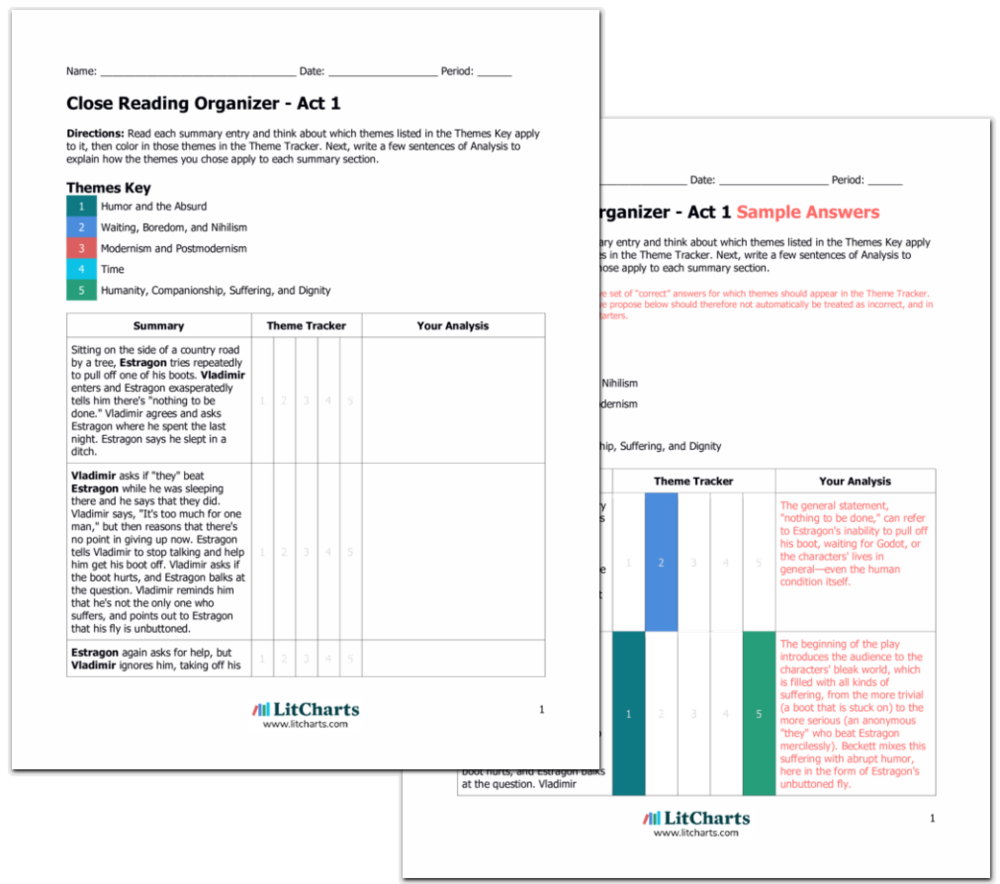

I think that the central appeal to Godot is the minimalistic theatrical refinement that is done to its script. I feel that this following last exchange says everything about the absurdism woven into the plot by Beckett: In the Theatre of the Absurd, their work focused largely on the idea of existentialism and expressed what happens when human existence has no meaning or purpose. The play is without any plot, character, dialogue and setting in the traditional sense, which reinforces the absurdist theme: the setting is a desolate country road, a ditch, and a leafless tree make up the barren, otherworldly landscape whose only occupants are two homeless men the dialogues were hard for me follow (because of their abrupt transitioning), – Estragon and Vladimir move between thoughts and ideas very quickly, often following no pattern of derivation the characters lack any sort of realism, and are absurdist metaphors/personifications of ideas (Pozzo and Lucky, their dynamic the little boy). This school of thought was triggered by WWII, in distraught France, which provided writers and philosophers an apt socio-political environment to pen their absurdist views. The set, remained constant, dismal and the only thing that moved in it was time – everything else remained the same, much like it was “waiting ” hence, I thought it was very allegorical to the play’s title.Ībsurdism, as I understood it, is a philosophy based on the belief that the universe is irrational and meaningless and the search for order brings the universe into conflict with the universe. Pozzo and Lucky, were a dramatic reiteration of Vladimir and Estragon and the little boy, the stark contrast. I looked at the entire cast as an embodiment of all the myriad themes of the existence of humans and philosophies, each of them representing individual, different, yet eclipsing attitudes. There is a boy who comes in both the Acts, Godot’s goatherd, to tell Vladimir and Estragon that Godot would not be able to come that day and would meet them tomorrow. There are three other supporting characters, who appear in both the acts: Pozzo (a landlord of some sort, left not described by Beckett), Lucky (Pozzo’s subservient, crazy, yet really wise slave, who Pozzo is going to sell at a fair) in Act 2, Pozzo is blind and Lucky is mute. It was by far one of the most inspiring works, I got to watch with respect to this class (and even in general!), sheerly because of the multiple layers of meaning (ironic because Absurdism shuns the idea of “finding meaning” as it proposes that the rest of everything is only “meaningless”) one can ascribe from this work. Estragon and Vladimir remain in that position throughout the play. Waiting for Godot, an absurdist play, by Samuel Beckett is “a tragicomedy in two acts” about two characters, Vladimir (DiDi) and Estragon (GoGo), who wait endlessly for the arrival of a person named Godot. the two acts are set in the same set (a barren “mound” with a leafless tree). Glenn on Glengarry Glen Ross Response- Laura Glucksman

Glenn on 2nd Live Performance- Laura Glucksman First Live Performance Review – Jack Williams.


 0 kommentar(er)
0 kommentar(er)
